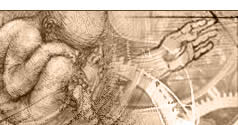 |
 |
 |
 |
 |
 |
 |
 |
|
 |
 |
 |
65 Paradigm of evolution
|
| Menu | back |
Polls have shown that many people are of the opinion that evolution theory is a scientifically- proven fact. Few know that scientists operate with provisional models (verification) and contradictions (falsification). The prevailing patterns of thought (paradigm) of evolution, primordial soup and the big bang theory are of philosophical origin (enlightenment, rationalism/naturalism) and cannot be proven with the methods of natural science.
In popular scientific publications, it is frequently maintained that the theory of evolution is a proven fact. This claim is not tenable on the basis of natural science. If we eliminate supernatural intervention by an intelligent creator from the very beginning and accept the models of evolution, primordial soup and the big bang theory as our paradigm, it is not possible to conclude that no creator exists, because we have excluded a creator from the very beginning.
Empirical and historical science:
Scientific theory distinguishes between empirical (experimental) and historical science. In both sectors, an attempt is made to first setup general explanations (hypotheses). Then, it is determined whether the prognosis derived from it actually applies.
In empirical science, verification can be accomplished by experimentation and observation. Perception and scientific theoretician Karl R. Popper explains,: The activity of the scientific researcher is to establish theorems or systems of theorems and to verify them systematically; in the empirical sciences, hypothesis and theoretical systems are established particularly and checked on the basis of experience made with observation and experiment (1).
In the historical sciences (which includes research on evolution, primordial soup and the big bang theory), this is not possible. The various interpretations have to be verified primarily according to plausibility criteria.
Conclusion:
The models of evolution, primordial soup and the big bang theory have not progressed beyond the status of a hypothesis. Even if we were successful in producing life in the laboratory, this does not mean that it was possible in the past without intelligence and state-of-the-art human technology.
These 66 | Menu |
back
|
Reference:
|
|
|
| |
Comment this Site!
|
 |
 |
 |
 |
|

